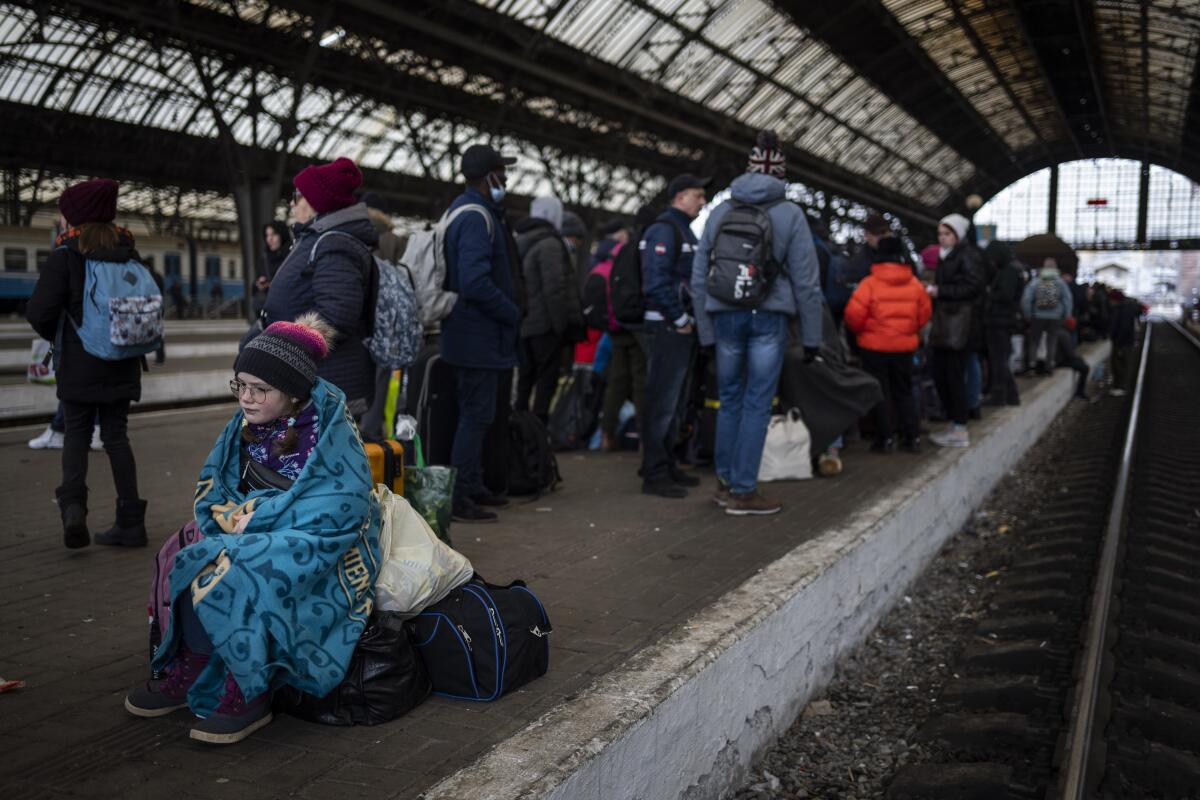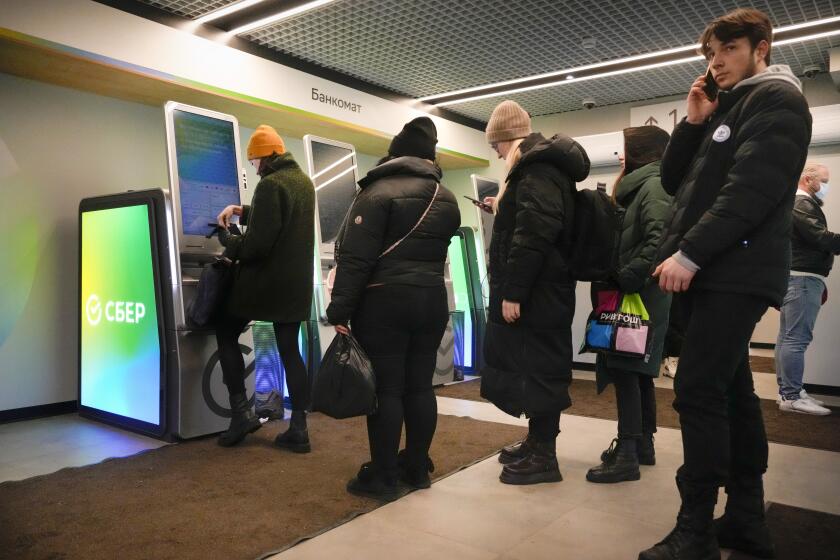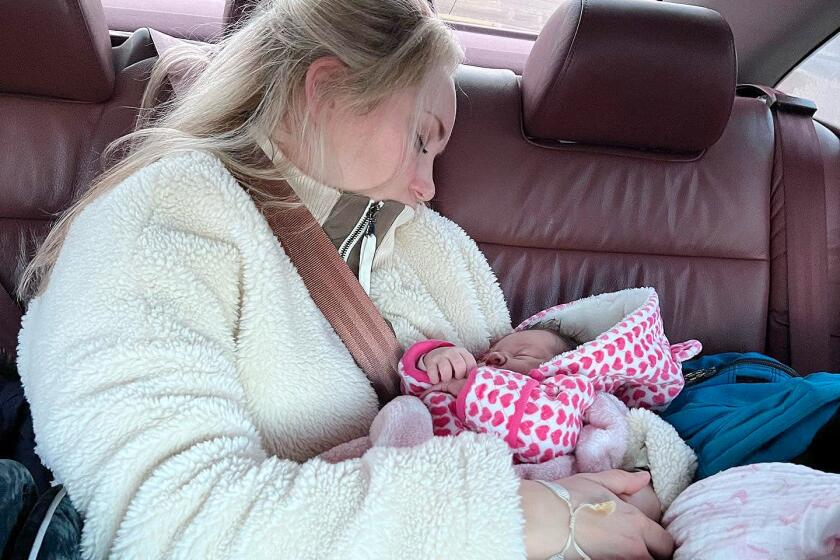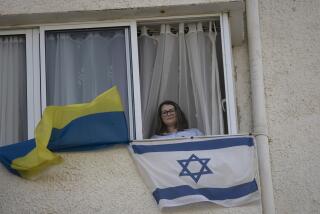Fleeing Kyiv with my family, our whole life in two suitcases

- Share via
LVIV, Ukraine — Every day for Ukrainians has become a nightmare. Troops in Russian helicopters land in neighborhoods, break into civilian houses, destroy buildings with tanks and fire their weapons at hospitals and orphanages. The stores are running out of bread and milk and the pharmacies are emptying of medicine. Putin calls it a special “denazification” and demilitarization operation and is not shy about saying he wants to take over all of Ukraine.
I work as a journalist in Kyiv. But on the fifth day of the war, I decided to leave the capital with my two young children for Lviv, a safer city in western Ukraine. We took a few things: a couple changes of clothes, a video camera, a bulletproof vest, a supply of diapers, a Lego Harry Potter set — which my older son loves — and a set of felt-tip pens that my younger son can’t live without. We left everything else in our Kyiv apartment on the left bank of the city: Ukrainian artwork, photography books, a collection of comics, copies of my book about the Russians who fought for the Islamic State.
Our whole life fit into two suitcases. My husband and I have already gone through this: I was forced to leave Crimea after Russia annexed the peninsula in 2014, and my husband took his family out of the occupied Donbas region, where separatists seized control. Putin’s war against Ukraine really began eight years ago, but back then the missiles landed only in one region. Now the war has spread all over the country.
U.S. and its allies have held off on taking the toughest sanction against Russia over Ukraine, worried about risks of political and economic blowback.
Driving through Kyiv to get to the railway station this week, I watched how the city had changed. Lines at supermarkets, checkpoints made of bricks and car tires, volunteer Ukrainian soldiers with machine guns on the side of the road. Most of the bridges across the Dnieper River, connecting the left bank of the city to the right, were blocked by military equipment. Only two bridges were open, and there was a long traffic jam of cars with people scrambling to leave the city.
I’ve seen this before, when I worked as a war correspondent in the Donbas territories eight years ago. The face of the largest city in eastern Ukraine, Donetsk, changed dramatically then.
War fundamentally alters the face of cities; it is imprinted on everything that previously seemed normal. Even the sky seems to change its color and acquire a grayish, rotten hue. With each shot and each explosion, the city’s colors are washed away more and more, mixing into a homogeneous dirty mass.
Passing though Kyiv, I saw track marks from tanks in yards and on roads. A shell destroyed a new building that served as a beautiful wedding hall. I saw a tram burned to the ground, and streets marked with funnels from fallen rockets. I noticed the stern faces of volunteer Ukrainian fighters and the worried faces of cyclists.
Kyiv’s train station is crowded with people these days. Thousands of Ukrainians are trying to get out of the war zone to the West. A few days ago, before the invasion, I had complained to friends about how tired I was of the atomization of a society divided by political disputes, Facebook algorithms and various prejudices.
Yet at the station, everyone came together: students from India and migrant workers from Central Asia, the homeless and top managers of tech companies, representatives of ethnic minorities and religious fanatics — everyone got onto the same train. No more disputes. The country’s 44 million residents now seem to be getting to know each other on these evacuation trains, and they are all united by full-scale war unleashed by the Russian president.
Jessie and Jacob Boeckmann, of Costa Mesa, escaped from Ukraine with their newborn in an effort to flee from the Russian invasion.
Those who are staying behind are risking their lives. Some spend days and nights in bomb shelters; some join local defense units; some organize logistics centers to help the military and refugees. The whole country has united into a single pulsating heart, which Russian shells can burst at any moment.
At the Lviv railway station exit, some fellow journalists met me late at night. They, too, had recently moved here from Kyiv to continue their work in relative safety. As I write this piece, a siren is roaring in Lviv. Russian missiles can reach this cozy business city on the border with Poland. Since the Russian bombing began last week, all Ukrainians have been living and hoping that we will survive and win. We are waiting for this endless nightmare to end.
Katerina Sergatskova is the editor in chief of Zaborona, a Kyiv-based news media outlet. @KSergatskova
More to Read
A cure for the common opinion
Get thought-provoking perspectives with our weekly newsletter.
You may occasionally receive promotional content from the Los Angeles Times.











